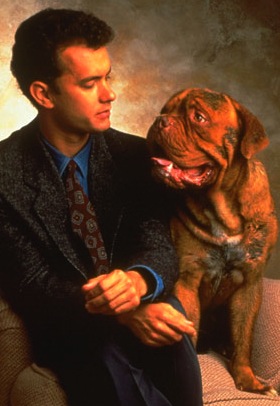Friday, July 28, 1989
TURNER & HOOCH. Written by Dennis Shyack, Michael Blodgett, Daniel Petrie Jr., Jim Cash and Jake Epps. Music by Charles Gross. Directed by Roger Spottiswoode. Running time: 97 minutes. Mature entertainment with the B.C. Classifier's warning: occasional violence and coarse language.
THE MUTT KNOWS HOW to make an entrance. Suddenly, he's there, huge and hostile, hurtling towards us from the window of the shack at the end of the pier.
He's no Rin Tin Tin. A true junkyard dog, this spittle-flecked, dirt-streaked cur is a living definition of "pug ugly."
At the dock's beach end, fastidious Cypress Beach police detective Scott Turner (Tom Hanks) holds his ground, an act of true grit rather than common sense.
Director Roger Spottiswoode offers us a good, long look at Hooch (Beasley). We're shown his charge down the dock in slow motion, the better to contemplate his mastiff's muscles, his nasty, knob-like head, his mean, foamy jowls.
As he gallops toward us, those jowls rise and fall rhythmically, revealing killer canines. Strauss's Also Sprach Zarathustra (perhaps best known to film buffs as the Slab song from 2001: A Space Odyssey) accompanies him on the soundtrack, our signal that this encounter will change Turner's life.
Or end it.
Bred for war by the ancient Britons, used in the bear-baiting pits of the middle ages, the De Bordeaux mastiff is the kind of dog that goes for the throat.
A cop. A dog. Isn't this where we came in?
Just three months ago [April, 1989], Jim Belushi was chasing around San Diego with a K-9 named Jerry Lee. That particular partnership was a lot less fun than we had expected.
Turner & Hooch, by contrast, is a lot more. And this is something we should have expected.
For one thing, the human here is Tom Hanks, an actor capable of bringing new comic insight to the most shopworn characters.
Last year, he was an Oscar nominee for his performance in the wish-fulfilment fantasy Big. Though far from the first picture of its kind, it was by every measure the best.
This summer, his deputy-dog comedy is the hands-down winner in the leash-law movie stakes. In Turner, Hanks offers us a character who is the exact opposite of Dragnet's slovenly, streetwise Pep Streebek.
A compulsively neat "investigator" in a town "where nothing ever happens," Turner must bring all of his book-learning to bear when junk dealer Amos Reed (John McIntyre) is murdered in the night.
Turner's only "witness" is Reed's decidedly unfriendly dog Hooch.
As shaped by Daniel (Shoot to Kill) Petrie Jr. (from earlier scripts by the writing teams of Dennis Shryack with Michael Blodgett and Jim Cash with Jack Epps Jr.), their story plays in three moods.
Turner has a danger-filled mystery to solve. At the same time, his guardianship of Hooch creates an involvement with the town veterinarian, earthy Emily Carson (Mare Winningham), a romance that needs to be resolved.
Primarily, though, it is the story of his partnership with Hooch, a comedy of evolving characters.
Balancing all the elements with taste and skill is Spottiswoode, whose last feature was the filmed-in-B.C. thriller Shoot to Kill. With Turner & Hooch, the Canadian-born director proves equally adept with action comedy.
The above is a restored version of a Province review by Michael Walsh originally published in 1989. For additional information on this archived material, please visit my FAQ.
Afterword: There's a wonderful moment in the first season of the Castle television series during which mystery writer Rick Castle (Nathan Fillion) is attempting to charm New York homicide detective Kate Beckett (Stana Katic). "We make a pretty good team, you know. Like Starsky and Hutch, Turner and Hooch." Beckett considers this for a moment, then counters with "You do remind me a little of Hooch." That comic exchange reminds me of the comic talents of Tom Hanks in the days before his Oscar-winning turns as AIDS patient Andrew Beckett (in director Jonathan Demme's 1993 Philadelphia) and all-American dimbulb Forrest Gump (in the 1994 Robert Zemeckis feature) won him respect and a succession of serious roles. Among my own favourites from his comedy days are the two pictures in which he co-starred with Canadian John Candy: the 1984 mermaid fantasy Splash, and the 1985 Peace Corps farce Volunteers. Hanks was terrific opposite another Canadian, Dan Aykroyd, in the 1987 cop show parody Dragnet, and picked up his first Oscar nomination for the warm-hearted Big. He was still in comedy mode when he played women's team coach Jimmy "there's no crying in baseball" Dugan In 1992's A League of Their Own. After that, though, he's worked for laughs mainly as a voice actor in animated features such as Toy Story (1995) and its sequels.
